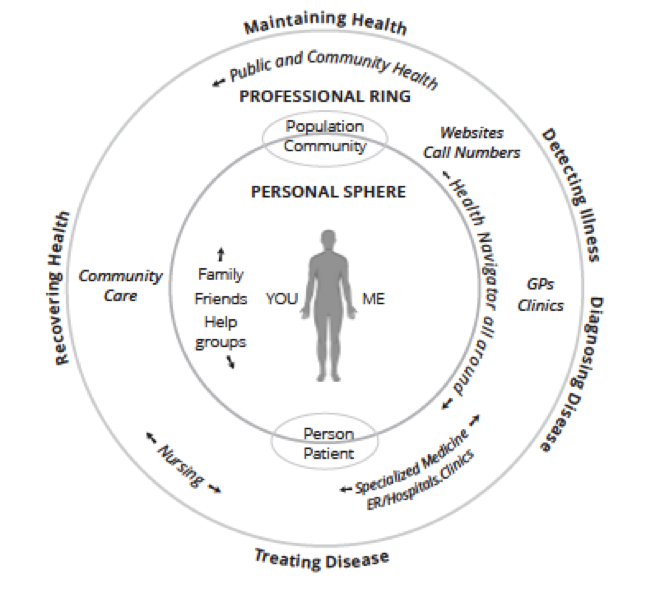The Haphazardly Informed We
18 May 2017This blog is adapted from two passages of my new book Managing the Myths of Health Care.
The patient is the “single most underused person in health care”. This means you and me. We are not casual players when it comes to our health, no matter how passive we may be in front of our doctors.
Much of the time, we are not even in front of them, or even patients. We have to take primary responsibility for the care of much of our own health, including the prevention of diseases. Moreover, we are often the “first responders.” We feel something coming on and get ourselves to a professional, or else just deal with some problem ourselves. (Have you put on a bandage lately?) And not just for ourselves. We can be the first responders for our children, sometimes even for our elderly parents. So we better be well informed.
How well are we informed? There is a vast array of health care information out there: how much of what we need to know actually gets to us? Is 10% a gross exaggeration?
I go into the supermarket and see eggs, Omega 3 and Organic. Which is better? I always mean to check on the Internet when I get home, but I always forget. What’s the use? The answer will probably change soon anyway. But it’s not the reliability of the information that bothers me so much as the rendering of it for my personal use.
So how do I get informed for my very survival? Haphazardly. Had I not had the radio on a particular day last year, I would not have heard that I no longer need to force eight glasses of water down my throat every day. But this year, had I listened to my medical friends and not gone to see a naturopath, I would not have found out that, for a particular condition I have, I had better drink all that water after all. Is this any way to get informed about my health—a radio program here, TV news there, a consultation, an article sent by a friend, and most systematically of all, ads telling me what pain killer to swallow?
And I’m advantaged: well educated, with time to read. Plus I have physician friends I can call about these things. And now, thanks to the Internet, I can find all kinds of information to misinterpret. Mostly, however, I am overwhelmed by the information available, and underwhelmed by what of it I get. I need HELP!!!
Health Navigator to the rescue
General practitioners, even the most responsive ones, are busy people. They have to diagnose, treat or refer, and advise—usually with a waiting room full of anxious people. We, the people out there, need something more.
So let me suggest the role of health navigator. Don't confuse this with nurse practitioner, who comes from the perspective of medicine, as a supplement to physicians. It should be noted that there's a lot more to health care than what physicians mostly do, including the promotion of health (especially diet), the prevention of many illnesses, and the treatment of those that medicine has yet to address (such as IBS and many auto-immune conditions). Other services, such as acupuncture, naturopathy, and homeopathy, do treat some of these conditions—in my experience, at times remarkably well—yet get marginalized by a medical establishment that can be doubly blind.
A health navigator, professionally trained, would provide information and advice to you and me, the persons beneath the patients—in our communities, beneath the epidemiologists’ populations. The health navigator would:
- Get to know us, as individuals and in our community, beginning with an extensive first interview about all aspects of our health (as homeopaths do), and continuing to maintain that understanding.
- Remain abreast of health care information in general, as well as of the reliable sites that provide it, and of the services that are available in our community.
- Provide us with whatever of that information each of us needs, alongside advice to help maintain our health.
- In the event of illness, guide us through the intricacies of diagnosis, treatment, and especially recovery.
The diagram below shows the five key aspects of health care—maintaining health, detecting illness, diagnosing disease, treating disease, and recovering health—around two concentric circles. The outer one is labelled the Professional Ring while the inner one, closer to ourselves, is labelled the Personal Sphere. The health navigator would work all around he circle—as shown in the diagram, in the Professional Ring but close to the Personal Sphere.
Seeing the Parts around the Whole


Must we leave the fate of our health to the haphazardness of the information marketplace as well as to the limitations of medical practice? Or shall we find our proper place in the care of our own health?
© Henry Mintzberg 2017 with passages from Managing the Myths of Health Care.
Follow this TWOG on Twitter @mintzberg141, or receive the blogs directly in your inbox by subscribing here. To help disseminate these blogs, we also have a Facebook page and a LinkedIn page.